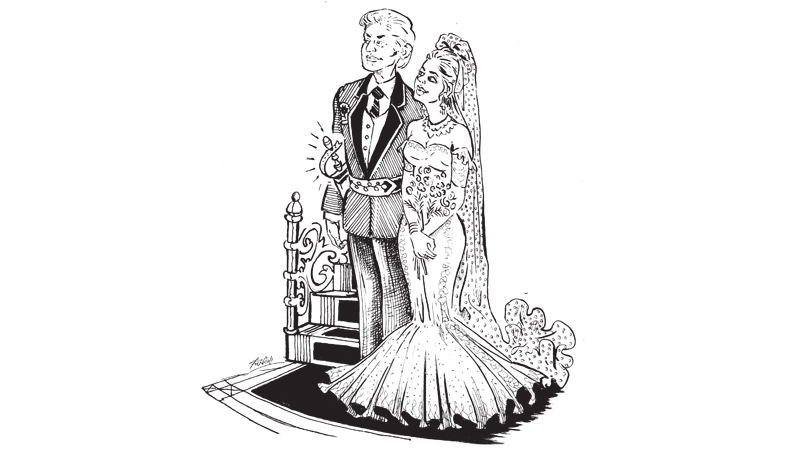 Not only children but also adults ask perplexing questions. They usually get surprising answers. Critics once called our national airlines a white elephant. A white elephant is usually a possession that is useless or troublesome, especially one that is expensive to maintain or difficult to dispose of.
Not only children but also adults ask perplexing questions. They usually get surprising answers. Critics once called our national airlines a white elephant. A white elephant is usually a possession that is useless or troublesome, especially one that is expensive to maintain or difficult to dispose of.
In fact, the government wants to sell the national airlines, but there are no takers. There is a story behind the white elephant. The king of Siam used to give white elephants to members of his court he wished to ruin. At the time the creatures were considered sacred and not allowed to work. However, they still had to be fed and cared for.
Cold shoulder
When a woman spurns a man, she is said to be giving him the cold shoulder. The phrase was first recorded in the early 19th century by Sir Walter Scott. It was customary for a hostess to serve hot meat to visitors who were welcome and cold meat given to those who were not. Since the cold meat given to the unwanted guest was usually a shoulder of mutton, the hostess was said to be giving him the cold shoulder. Today, the cold shoulder means a show of intentional unfriendliness or rejection.
A zero score in tennis is called ‘love.’ The term originated in France where tennis first became popular. Some people apparently thought a big zero on the scoreboard looked like an egg and, therefore, called it the egg, which is ‘l’oeuf’ in French. When tennis became popular in England, the people copied the French and also called the zero ‘l’oeuf’, but pronounced it ‘love.’
Red herring
These days, we hear some deliberately misleading information. If you wish to know what they are, simply read what appears on You Tube. A red herring is or is intended to be misleading or distracting. The term stems from fox hunting. Red herrings were used to train dogs to follow a fox’s scent and not be diverted to a false trail.
A few decades ago, the ‘Sun’ newspaper carried a boxed story on page one asking readers to burn it to read a hidden message. Some gullible readers followed the instructions. Instead of a hidden message, they found some ash. They had forgotten that the item appeared on April Fools’ Day which falls on the first of April.
Until the latter part of the 16th Century, the European New Year began in late March and marked the beginning of spring. To celebrate the New Year, they held festivities involving much gift giving and party-going for several days. The festivities culminated on April 1. After some time, the king of France authorised a change in the calendar moving the beginning of the New Year to January 1.
However, some people refused to honour the change and continued to exchange gifts and hold parties on April 1. Because of this practice, they were called April fools and were mocked by others who sent them frivolous presents and played pranks on them. Even today, some April fools can be found in our society.
Blue is traditionally seen as the colour of constancy, as well as the colour of sorrow, and anguish, and of plague and hurtful things. It is also associated with the male sex (as pink is with the female sex). Politically, blue was associated with the Scottish Presbyterian or Whig Party in the 17th century, and later with the Tory and then the Conservative Party which ruled Britain. In Sri Lanka, blue is associated with the Sri Lanka Freedom Party which is now in turmoil.
Why is the sky blue?
Sometimes, we wonder why the sky is blue. When sunlight which is a mixture of all the colours of the rainbow passes through the earth’s atmosphere, gas molecules and dust particles scatter their colours. Those colours with the shortest wavelengths are the most easily scattered. Since the shortest light waves appear blue, it is blue we see when we look at the sky.
The ladder plays an important role in mythology. That is why they say that it is bad to walk under a ladder. A ladder leaning against a wall forms a triangle, the symbol of the Trinity in Christian theology and the mystic number three. It was once believed that to walk through the triangle would be to defy the Trinity and risk divine wrath. Why do people cross their fingers for good luck? Early Christians made the sign of the cross this way to ask for divine help without attracting the attention of pagans.
The word ‘bloody’ is used to emphasise what you are saying, in a slightly rude way. Sometimes you say, “It’s a bloody good idea” when you agree with someone. We say “Bloody hell” to express surprise. In speech, they are quite admissible.
“Bloody” is also used informally to express anger, annoyance, or shock. From the mid -18th century until quite recently, “bloody” is used as a swear word which is regarded as unprintable. Probably, this arises from the mistaken belief that it implied a blasphemous reference to the blood of Jesus Christ. So we no longer use “bloody” in formal English.
Have you ever wondered why men’s clothes have buttons on the right while women’s are on the left? It is easier for right-handed people who belong to the majority to push buttons on the right through holes on the left. So men’s clothes have buttons on the right. When first used, buttons were very expensive and they were worn primarily by wealthy people. Women in that class were usually dressed by their maids. Since a maid would face the woman she dresses, dressmakers put the buttons on the maid’s right – the woman’s left where they have remained until today.
“Always a bride’smaid, never the bride” is a proverbial saying coming down from the 19th century. Even today, there is a popular belief that if you volunteer to be a bride’s maid too often, it will be unlucky for your own marriage. By the way, why does a bride always stand on the groom’s left? In days when men often captured their brides from neighbouring villages, a groom had to keep his sword hand – the right one – free during the ceremony to fend off a possible attack by the bride’s kinsmen or jealous suitors.
Some time ago, most newspapers and magazines carried agony columns. Originally, an agony column in a newspaper contained special advertisements, particularly those for missing relatives or friends and thus exposing great distress. Later, it became a column in a newspaper or magazine offering advice on personal problems to readers who write in. An agony aunt is the female author of an agony column who offers advice. Some time ago, a local newspaper had an agony aunt who was actually a senior male journalist!









